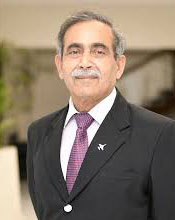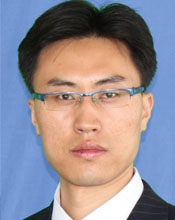Mar. 24, 2021 |
This Sandia CMC panel discussion covers the evolving crisis onset and escalation risks enabled by emerging technologies and military capabilities to assess their implications for strategic stability in the region. Technologies and capabilities under consideration include globally new developments, such as capabilities enabled by artificial intelligence, as well as those that may not be new globally but are being deployed by new actors in the region.
A recording of this seminar can be viewed here.
Future interstate crises in Southern Asia and the Indo-Pacific will be defined by multipolarity, asymmetric warfighting capabilities in overlapping and evolving domains, blurry “red lines”, and nuclear competition. Developments in power-projection by key nuclear-armed stakeholders in the region may create new escalation risks alongside opportunities for cooperative security and risk reduction. This Sandia CMC panel discussion will cover the evolving crisis onset and escalation risks enabled by emerging technologies and military capabilities to assess their implications for strategic stability in the region. Technologies and capabilities under consideration include globally new developments, such as capabilities enabled by artificial intelligence, as well as those that may not be new globally but are being deployed by new actors in the region.
Participation in this online event is limited, but it will be recorded for later viewing. Please register by 5:00 pm MST on March 23 to receive a link to the online meeting. Email CMC@sandia.gov with questions for the speaker before or during the event, or with questions about the event.
Panelists

M. Ashfaque Arain, Pakistan Air Force Air Marshal (ret.), (@AshfaqueArain2) is the Director of Strategic Defence and Security at the Centre for Aerospace and Security Studies Islamabad (CASS). He is a graduate of Combat Commanders’ School, PAF Air War College, and National Defence University. He holds a master’s degree in Defense & Strategic Studies from Air War College (AWC) and a master’s degree in War Studies from National Defense University (NDU), Islamabad. In his 41 years as a fighter pilot with Pakistan Air force, the Air Marshal flew various top-of-the-line fighter aircraft with a singular honor of being first PAF pilot to achieve 2000 hours on the F-16 aircraft. During his career, he has served in senior command and staff assignments including command of a fighter squadron, an operational base, Air Adviser Pakistan’s High Commission in New Delhi, Chief Project director Horizon, Assistant Chief of the Air Staff (Operations), Assistant Chief of the Air Staff (Plans), Director General Air Force Strategic Command (AFSC), Director General Projects, and Deputy Chief of the Air Staff Administration). Air Marshall Arain’s research specialties include India-Pakistan relations, strategic defense and security, nuclear deterrence, air power employment, and unconventional warfare. In recognition of his meritorious services, the Air Marshal has been decorated with the distinguished awards of, Tamgha-i-Imtiaz (Military), Sitara-i-Imtiaz (Military), Hilal-i-Imtiaz (Military) and Sitara-i-Basalat.

Feroz Hassan Khan, Pakistan Army Brigadier General (ret.), currently serves as a research professor at the U.S. Naval Postgraduate School. Brigadier Khan has experience in combat action and command on active fronts on the Line of Control in Kashmir, the Siachin Glacier, and the Pakistan-Afghanistan border. He has worked on numerous assignments in the United States, Europe, and Asia. He served as Director Arms Control and Disarmament Affairs, in the Pakistan’s Strategic Plans Division, Joint Services Headquarters. Brigadier Khan had been a key contributor in formulating Pakistan’s security policies on nuclear and conventional arms control and strategic stability in South Asia. He produced recommendations for the Ministry of Foreign Affairs and represented Pakistan in several multilateral and bilateral arms control negotiations on peace and security in South Asia and international treaties related to weapons of mass destruction. Brigadier Khan holds an M.A. International Relations from the School of Advanced International Studies (SAIS), John Hopkins University, Washington DC. He has held a series of visiting fellowships at Stanford University, the Woodrow Wilson International Center for Scholars; the Brookings Institution; Center for Non-Proliferation Studies at the Monterey Institute of International Studies and at the Cooperative Monitoring Center, Sandia National Laboratory. He also taught courses as a visiting faculty at the Department of the Defense and Strategic Studies, Quaid-e-Azam University, Islamabad. He has widely participated in international and national conferences on strategic issues, international security, terrorism, nuclear arms control and non-proliferation issues. Brigadier Khan has published widely, most famously his book Eating Grass: The Making of the Pakistani Bomb.

Tong Zhao (@zhaot2005) is a senior fellow in the Nuclear Policy Program at the Carnegie Endowment for International Peace, based in Beijing at the Carnegie–Tsinghua Center for Global Policy. His research focuses on strategic security issues, such as nuclear weapons policy, deterrence, arms control, nonproliferation, missile defense, hypersonic weapons, and China’s security and foreign policy. Mr. Zhao serves on the board of directors of the Asia-Pacific Leadership Network for Nuclear Non-Proliferation and Disarmament and on the advisory board of the Missile Dialogue Initiative. Mr. Zhao is also an associate editor of Science & Global Security and is a member of the International Panel on Fissile Materials. Previously he was a Stanton Nuclear Security Fellow at Harvard University, a nonresident WSD-Handa Fellow at Pacific Forum, and worked for the Office of Foreign Affairs of the People’s Government of Beijing Municipality. He holds a PhD in science, technology, and international affairs from Georgia Institute of Technology, as well as an MA in international relations and a BS in physics from Tsinghua University. Mr. Zhao is the author of “Tides of Change: China’s Nuclear Ballistic Missile Submarines and Strategic Stability” and “Narrowing the U.S.-China Gap on Missile Defense: How to Help Forestall a Nuclear Arms Race.”

Sylvia Mishra (@MishraSylvia) is a doctoral researcher at King’s College London, where her research focuses on nuclear strategy and nonproliferation, Southern Asian security, and emerging technologies. She co-chairs both the Chemical, Biological, Radiological, and Nuclear Working Group for Women of Color Advancing Peace & Security (WCAPS) and the Indian Women in International Relations Forum at Global Policy Insights. A CSIS Mid-Career Cadre scholar, Ms. Mishra was previously an India-US Fellow at New America, an Accelerator Initiative Fellow at the Stanley Center for Peace and Security, a Scoville Fellow at the Nuclear Threat Initiative, a Visiting Fellow at the Center for Nonproliferation Studies, a Carnegie New Leader. She also worked in New Delhi at the Observer Research Foundation on India-U.S. defense and security ties. Ms. Mishra has been invited to present papers, deliver talks, and participate in crisis simulation and Track 2 dialogues at various national and international forums. Her publications include book chapters, journal articles, and opinion pieces, and she was featured in Women in Foreign Policy. She holds a BA in political science from Hindu College, University of Delhi, an MSc in international relations from London School of Economics, and an MA in nonproliferation and terrorism studies from the Middlebury Institute of International Studies.

Andrew Reddie (@areddie89) is a Senior Member of the Technical Staff at Sandia National Laboratories and a Postdoctoral Fellow at the University of California at Berkeley, where he works on projects related to wargaming, nuclear issues, and cybersecurity. Dr. Reddie is currently a Bridging the Gap New Era Fellow, Hans J. Morgenthau Fellow, and a Krulak Center Non-Resident Fellow at Marine Corps University. His work has appeared in publications such as Science, the Bulletin of Atomic Scientists, and the Journal of Cyber Policy.
Moderator

Hannah Haegeland (@HHaegeland) is a Senior Member of the Technical Staff at Sandia National Laboratories with expertise in Indian Ocean Region and South Asian regional security, nuclear issues, interstate crises, and risk reduction. She manages South Asia engagement for Sandia’s CMC, promoting global security in the 21st century through scientific engagement. In this capacity, Ms. Haegeland convenes Track 1.5 and Track 2 engagements, designs and facilitates wargames and tabletop exercises, leads cooperative research studies between the CMC and partner countries, and supports Sandia training workshops, courses, and laboratory visits. Her recent research focuses on cyber and emerging technology-enabled escalation in Southern Asia and prospects for cooperative risk reduction measures. Ms. Haegeland is a co-editor and author of Investigating Crises: South Asia’s Lessons, Evolving Dynamics, and Trajectories (Stimson, 2018) and her analysis has been featured in a variety of policy outlets including Foreign Affairs and the Bulletin of Atomic Scientists. Prior to joining Sandia, Ms. Haegeland held research and teaching positions in Kathmandu, New Delhi, and Washington, D.C.